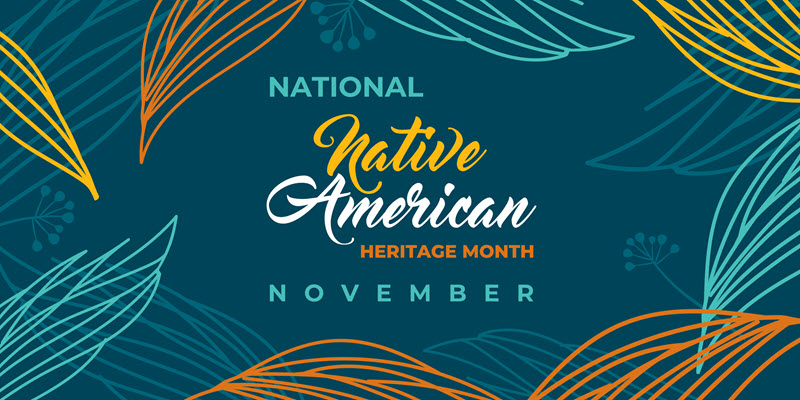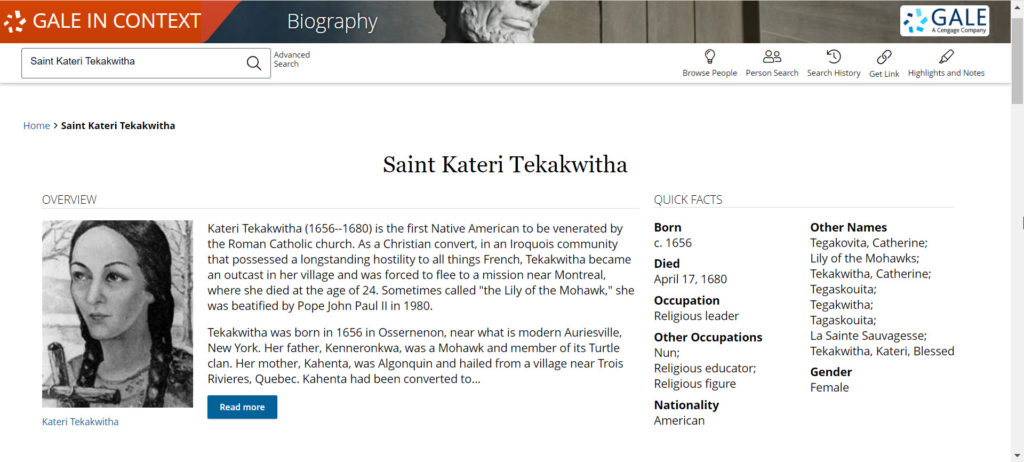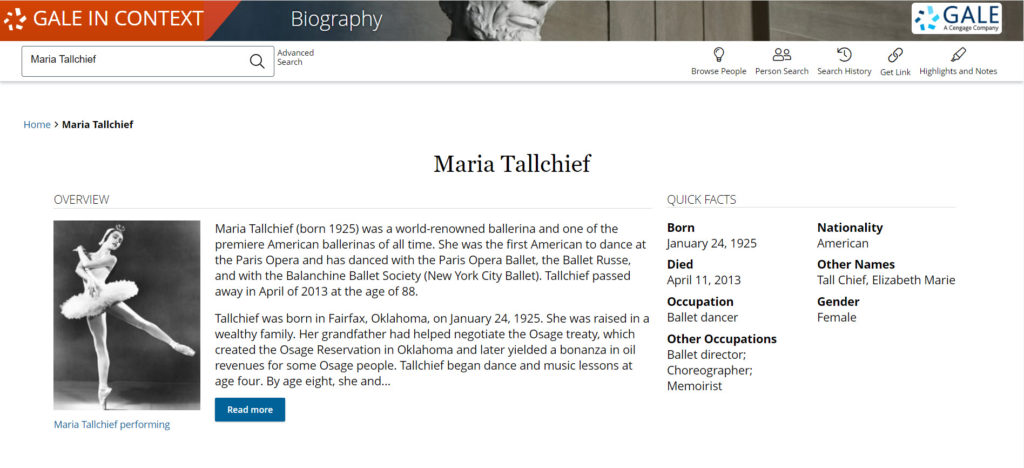| By Carol Brennan |
November is U.S. Native American Heritage Month, providing Americans the chance to reflect on the original caretakers of our continental treasures. Since the first-known contact with Europeans in the sixteenth century, Native Americans have played a decisive role in shaping American history and culture. Gale In Context: Biography features hundreds of biographies of prominent Native Americans from the past as well as leading activists, artists, and game changers who continue to positively impact twenty-first-century life in the United States.
In the struggle to end forced relocations and other violence perpetrated on Native Americans, the list of legendary names featured in In Context: Biography includes Wampanoag chief Massasoit, Shawnee chief Tecumseh, Sioux leader Sitting Bull, Apache warrior Geronimo, and Seminole chief Osceola. Gale resources also provide informative profiles of lesser-known figures from American history, among them Saint Kateri Tekakwitha, a Mohawk woman who became the first Native American woman to be honored as a saint in the Roman Catholic Church. Neolin, a Lenni Lenape also known as the Delaware Prophet, was an influential leader who urged Native Americans to abstain from alcohol and reject the material goods offered to Native American communities in the Ohio Valley and Great Lakes regions. Another overlooked figure is Ishi, a Yahi whose 1916 death in San Francisco prompted newspaper tributes to a man often known as the last living Native American who had never been in contact with a person of European origin.
In the early decades of the twentieth century, the most celebrated athletes of Native American heritage were Jim Thorpe, a Sac and Fox multisport powerhouse who in 1912 became the first Native American to win the Olympic gold. The emergence of surfing is widely credited to the heroic feats depicted in early Hollywood footage of Duke Kahanamoku, a native Hawaiian. In the modern era, Oren Lyons, a Seneca and professor, became one of the leading proponents of lacrosse, the only Native American sport that is played in organized leagues at all levels, from youth to collegiate to professional.
In Context: Biography also features a trove of essays on Native Americans in the arts. These include Maria Tallchief, the Osage celebrated as the first American woman to become a prima ballerina, and N. Scott Momaday, a Kiowa who in 1969 became the first Native American to win the Pulitzer prize. Beacons of twenty-first-century progress include Joy Harjo, the Muscogee poet who in 2019 became the first Native American to be named U.S. poet laureate, and Jason Momoa, a native Hawaiian and popular star of Hollywood action films.
One of the first Native Americans to represent Indigenous communities at the highest levels of the U.S. government was Charles Brent Curtis, a Kaw who in 1924 became the first American affiliated with a tribe to be elected to the U.S. Senate in 1914. He went on to serve as U.S. vice president from 1929 to 1933. Following that lead is Winona LaDuke, an Ojibwe and former U.S. vice presidential candidate who played a significant role as an environmental activist involved in the Dakota Access Pipeline protests at the Standing Rock Indian Reservation in North Dakota in 2016–17. Other trailblazers who have emerged in recent years include Diane Humetewa, a Hopi who became the first Native American woman and first tribal member to serve on the U.S. federal judiciary. The Laguna Pueblo community rejoiced in President Joe Biden’s choice of Deb Haaland, the congresswoman from New Mexico who in 2021 became the first Native American to serve as a U.S. cabinet secretary when she was confirmed as the new secretary of the interior.
The powerful stories from the past and topical content on contemporary leaders found in In Context: Biography serve to illuminate the history celebrated each November in Native American Heritage Month.
You can read more about these Native Americans and others in Gale In Context: Biography.
Not a Gale In Context: Biography subscriber? Learn more about this authoritative database >>

About the Author
Carol Brennan has been writing biographical entries for Cengage/Gale since 1993. If she’s not writing, she is either at yoga or walking her dachshund. Carol consumes an alarming volume of podcasts and audiobooks weekly.



